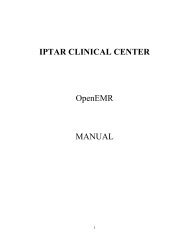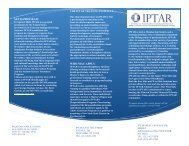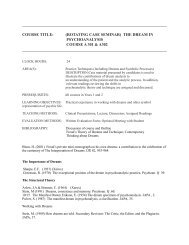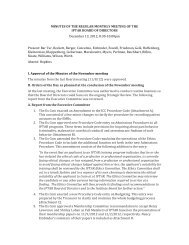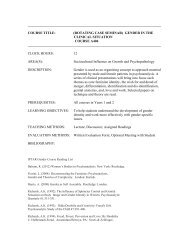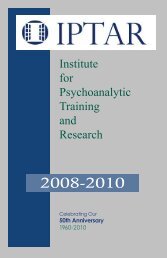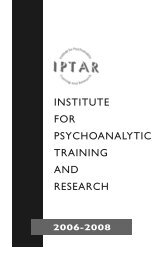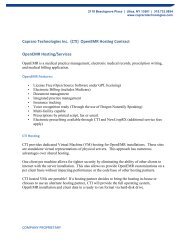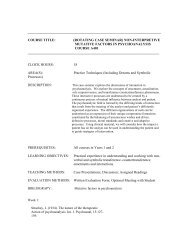IPTAR Bulletin - Institute for Psychoanalytic Training and Research
IPTAR Bulletin - Institute for Psychoanalytic Training and Research
IPTAR Bulletin - Institute for Psychoanalytic Training and Research
Create successful ePaper yourself
Turn your PDF publications into a flip-book with our unique Google optimized e-Paper software.
18<br />
Gender in the Clinical Situation:<br />
Rotating Case Seminar<br />
(Eight Weeks)<br />
Arlene Kramer Richards, Ed.D.<br />
Gender is used as an organizing concept to approach material presented by<br />
male <strong>and</strong> female patients in psychoanalysis. A series of clinical presentations will<br />
bring into focus such themes as core feminine identity, the wish <strong>for</strong> <strong>and</strong> dread<br />
of merger, differentiation, identification <strong>and</strong> dis-identification, genital anxieties,<br />
<strong>and</strong> love <strong>and</strong> work. Selected papers on technique <strong>and</strong> theory are read.<br />
Transference <strong>and</strong> Countertransference in<br />
Working with the Borderline Patient:<br />
Rotating Case Seminar<br />
(Eight Weeks)<br />
Andrew Druck, Ph.D. / Bennett Roth, Ph.D. (alternating years)<br />
Through the examination of segments of the treatment process presented<br />
by c<strong>and</strong>idates, the patient’s dynamics, psychic structure, <strong>and</strong> developmental issues<br />
are examined as they are revealed in the transference. Concurrently <strong>and</strong><br />
as appropriate,the countertransference is explored in terms of the transferencecountertransference<br />
dynamic as well as in its own right. Specific aspects of the<br />
literature are reviewed as they become relevant to the cases under discussion.<br />
Transference <strong>and</strong> Countertransference in<br />
Working with the Narcissistic Patient:<br />
Rotating Case Seminar<br />
(Eight Weeks)<br />
Sheldon Bach, Ph.D. / Mary Libbey, Ph.D. (alternating years)<br />
Case presentations by class members are used to examine subjective experiences,<br />
developmental issues, <strong>and</strong> technical difficulties in working with narcissistic<br />
patients. Readings on these issues are reviewed to illuminate the<br />
discussion.<br />
Application of Classical Technique with the<br />
"Non-Classical" Patient: Continuous Case Seminar<br />
(Sixteen Weeks)<br />
Mark Grunes, Ph.D. / Irving Steingart, Ph.D. (alternating years)<br />
The focus of this seminar is the psychoanalytic treatment process with a patient<br />
who has difficulty utilizing the traditional psychoanalytic situation. The seminar<br />
deals with the application of the psychoanalytic method, classically conceived,<br />
<strong>for</strong> patients suffering from borderline pathology <strong>and</strong> severe narcissistic character<br />
disturbances. Those structural issues that produce instances of transference<br />
experience in which neither language nor action operates in a manner suited <strong>for</strong><br />
a classically conceived psychoanalytic process (relationship) are considered.<br />
Either a single case or two cases will be followed throughout the seminar. In<br />
general,the ef<strong>for</strong>t is to illustrate variations in interventions while retaining the<br />
framework of the classical situation.<br />
The Cultural Contexts of Psychoanalysis:<br />
Healing Across Boundaries of Ethnicity <strong>and</strong> Race<br />
(Eight Weeks)<br />
Michael Moskowitz, Ph.D.<br />
This course will begin with a brief overview of psychotherapy be<strong>for</strong>e Freud<br />
<strong>and</strong> the trans<strong>for</strong>mations undergone by psychoanalysis throughout history<br />
<strong>and</strong> culture. It will explore some of the <strong>for</strong>ces that have led to current variations<br />
in psychoanalytic theory <strong>and</strong> practice <strong>and</strong> examine how particular<br />
<strong>for</strong>ms of psychoanalysis have or have not taken root in different cultures<br />
throughout the world.The course will focus on the idea of psychic healing as<br />
understood across a variety of cultures, <strong>and</strong> will approach the diversity of<br />
clinical experience from this broadened conceptual frame. All of this will be<br />
explored in relationship to the c<strong>and</strong>idates’ case presentations. Some of the<br />
reading will be chosen based on the c<strong>and</strong>idates’ interests <strong>and</strong> experience.<br />
BEYOND THE BASIC CURRICULUM<br />
The Beyond the Basic Curriculum program offers a series of elective seminars<br />
to both advanced c<strong>and</strong>idates (third year <strong>and</strong> beyond) <strong>and</strong> <strong>IPTAR</strong> members.<br />
Seminars vary from year to year <strong>and</strong> include: topics not covered in the basic<br />
curriculum, subjects c<strong>and</strong>idates wish to pursue in greater depth, seminars that<br />
explore a particular area of interest or expertise of an <strong>IPTAR</strong> faculty or Society<br />
member,as well as courses that are required but may be taken out of sequence<br />
to meet the requirements <strong>for</strong> licensing as a psychoanalyst. To facilitate ongoing<br />
involvement in psychoanalytic learning,c<strong>and</strong>idates are required,after completing<br />
their basic course requirements, to take one Beyond the Basic Curriculum<br />
seminar per year until graduation.<br />
19




